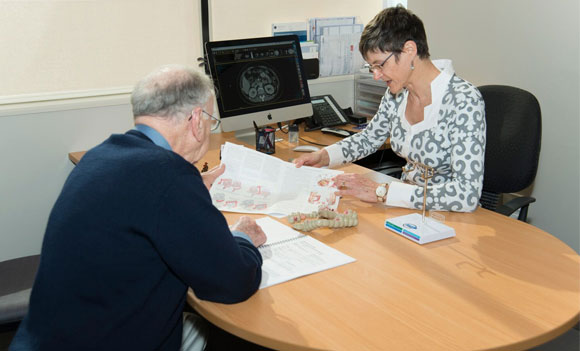What is Crohn’s disease?
Crohn’s disease is a chronic inflammatory disease of the gut.
It is an autoimmune condition. This means that your immune system thinks parts of your gut are foreign and it attacks them. The lower part of the small intestine and the colon are most commonly affected.
The attack by the immune system creates inflammation of the gut wall, which leads to ulcers and bleeding, and to symptoms such as pain and diarrhoea.
If you have Crohn’s disease, you will usually have ‘flare ups’ of symptoms followed by periods of ‘remission’.
Crohn’s disease and ulcerative colitis are collectively known as inflammatory bowel disease (IBD). More than 75,000 Australians have IBD. Inflammatory bowel disease should not be confused with irritable bowel syndrome (IBS).

What are the symptoms of Crohn’s disease?
The most common symptoms of Crohn’s disease are:
- abdominal pain/cramps
- diarrhoea (sometimes with blood)
- fatigue
- weight loss.
Crohn’s disease can affect the whole digestive tract, from mouth to anus. So some people also experience mouth sores and anal problems such as anal fissures and anal fistulas.
Crohn’s disease can also cause symptoms outside of the digestive tract including:
- eye inflammation/redness
- joint pain
- a skin rash
- liver problems.
Flare ups of symptoms may be triggered by things like infections, hormonal changes and smoking.
What causes Crohn’s disease?
Why your immune system attacks your gut is not known. It might be due to an abnormal immune system response to normal gut bacteria or a virus.
There may be a genetic cause as it appears to run in some families and some ethnic backgrounds (e.g. Ashkenazi Jews). Smoking also puts you at a higher risk for the disease.
How is Crohn’s disease diagnosed?
Your doctor will start by asking about your symptoms and performing a physical examination. Your doctor will then probably recommend some testing.
Tests that may be done to diagnose Crohn’s disease include:
- blood tests
- faecal tests
- X-rays
- colonoscopy
- gastroscopy.
Sometimes CT or MRI scanning may be needed.
How is Crohn’s disease treated?
Your treatment will depend on what symptoms you have and how severe they are.
Medical treatment
Crohn’s disease is most commonly managed by a physician with specialist training in inflammatory bowel disease (a Gastroenterologist). The most common treatment for Crohn’s disease is medication. Mild symptoms may be managed by over-the-counter medicines to stop diarrhoea. You should talk to your doctor before using these medicines as they can have side effects.
Your Gastroenterologist might prescribe medication to control the inflammation. Commonly used medicines are:
- 5-aminosalicylates (5-ASAs for short)
- antibiotics
- corticosteroids
- immunomodulators
- biological response modifiers.
Your Gastroenterologist will talk to you about the benefits and possible side effects of any medication prescribed.
Surgery
Sometimes it is necessary for a colorectal surgeon to help treat your Crohn’s disease and the affected parts of your gut may be surgically removed.
Crohn’s disease may be treated with surgery if:
- your symptoms cannot be controlled by medicine
- you have serious side effects from medicines
- your symptoms can only be controlled with long-term use of corticosteroids
- you have complications from Crohn’s disease such as bowel obstruction or stricture.
Surgery is not a cure for Crohn’s disease. The disease tends to return to other areas of the intestines after surgery.
Generally, as little of the intestine as possible is removed to keep the gut working normally. But, sometimes the whole colon and rectum are removed. In this case, your anus is sewn closed and the end of your small intestine is attached to a small opening (a stoma) in your lower abdomen. A bag is attached to the opening to collect waste.
Your Crohn’s disease specialist will help you decide if surgery is a good option for you.
